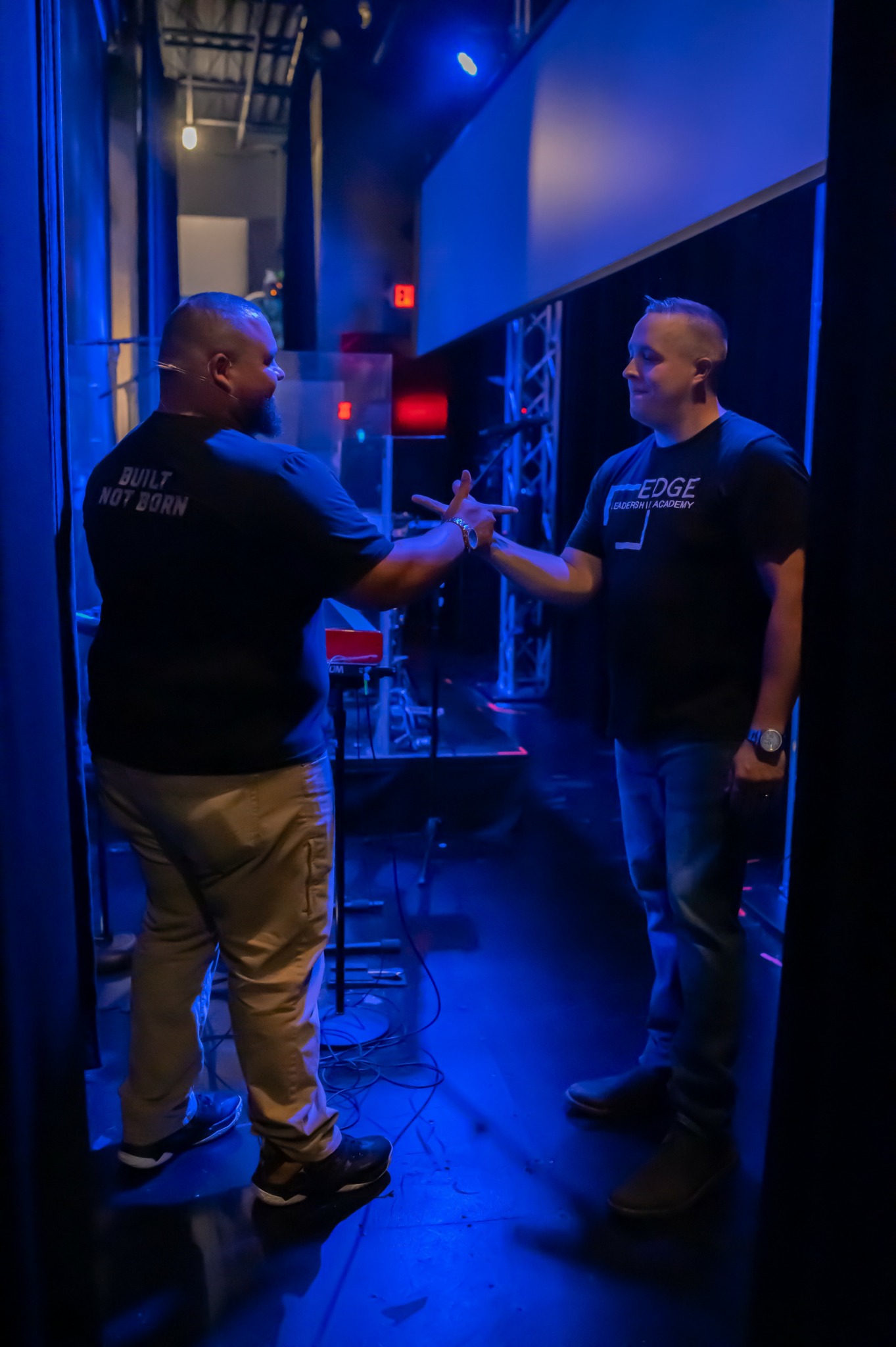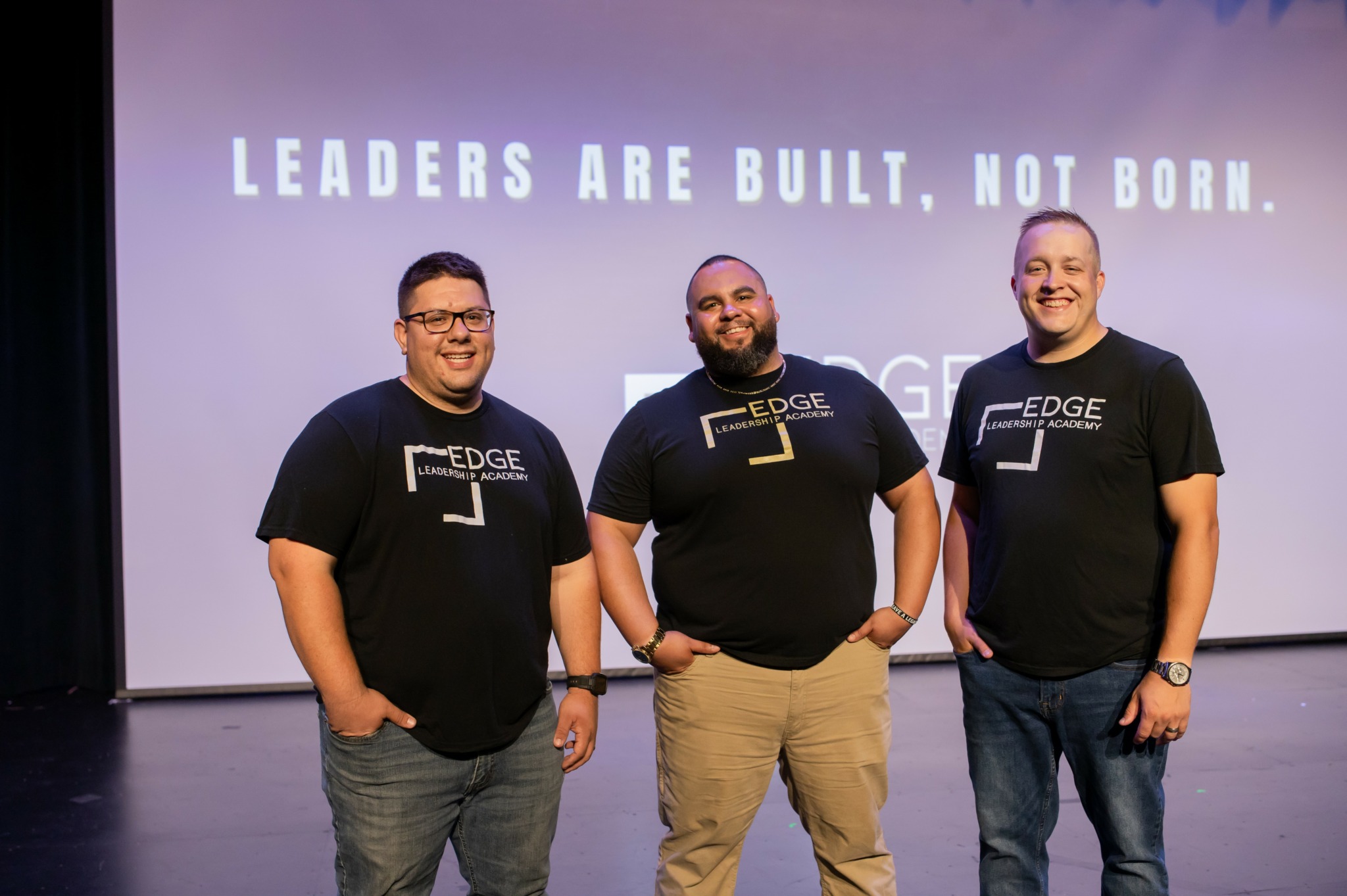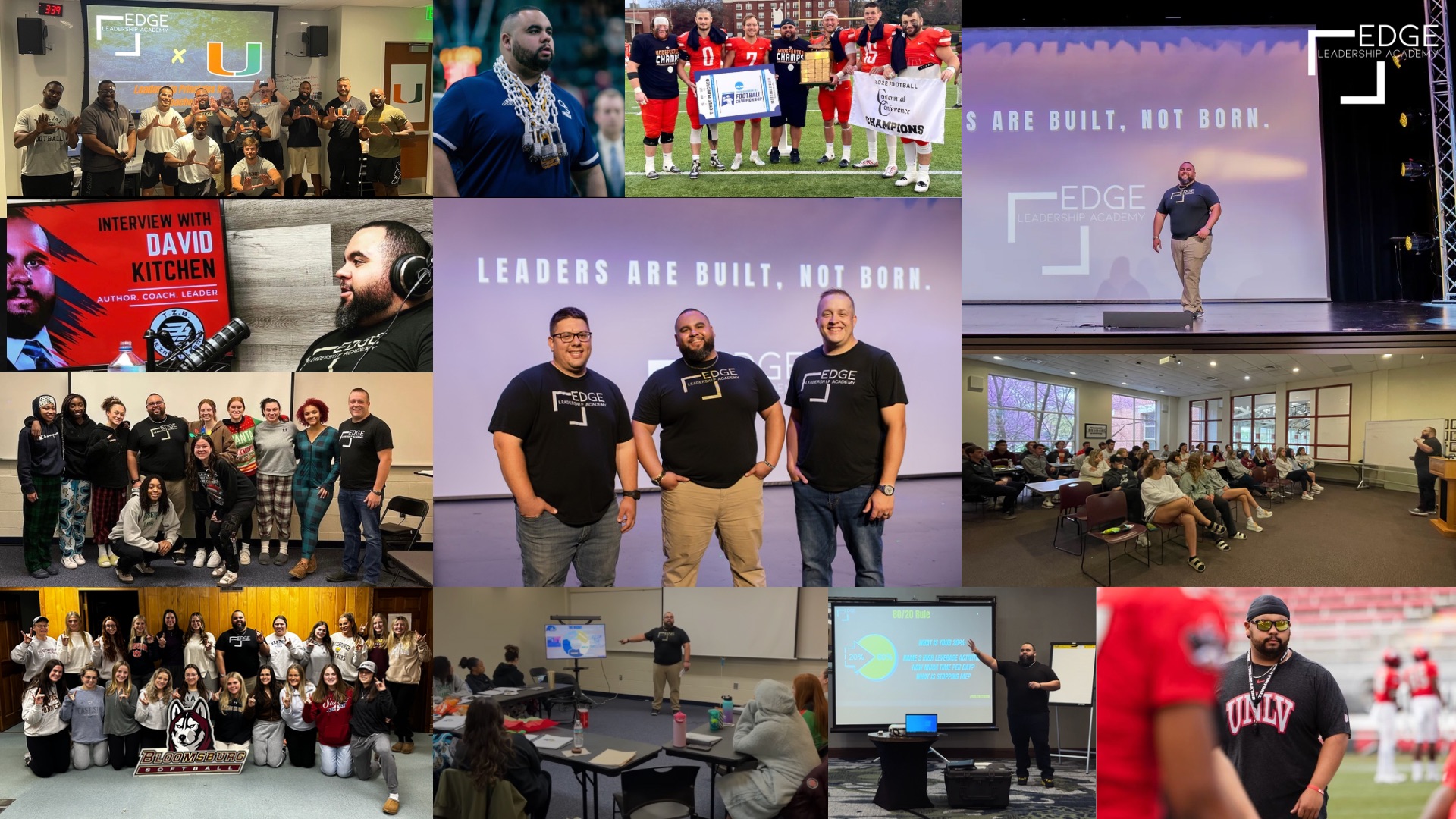Alright – so today we’ve got the honor of introducing you to David Kitchen. We think you’ll enjoy our conversation, we’ve shared it below.
David , appreciate you joining us today. If you’re open to it, can you talk to us about the best (or worst) investment you’ve made. What’s the backstory and the relevant context behind why you made the investment
About 6 months after launching my first business, Edge Leadership Academy, the company was profitable and I was convinced I had the entrepreneurship game figured out. I couldn’t understand why people said running a business was so hard, and I couldn’t have been more wrong. This led to me saying yes to entirely too many opportunities. I launched multiple businesses, invested in companies, and joined the board of several start ups.
Later that year, I was approached to partner in a 22,000 square ft performance center that would be the premiere training facility in the area. We had everything; full sized boxing rings and batting cages, a top of the line weight room, a full indoor artificial turf field, spin bikes, yoga, the works. The problem was, I didn’t understand anything about partnerships, running a brick and mortar location, or even running a commercial gym. I thought my background and reputation as a big time college coach would be all the marketing we needed.
We opened and closed the gym in less than a year. My business partner bought me out to focus on other ventures, and I failed miserably. I ended up spending 12-14 hours a day in the gym because my ego wouldn’t let me admit I was failing, and all my other businesses suffered as a result. About 10 months in I hit a wall. I finally admitted to myself if I didn’t cut my losses on the gym, I was going to lose all my businesses. I made the decision to close the doors on not only the gym, but all the other ventures I had going that weren’t performing and refocus on my core business, Edge Leadership Academy.
I say this gym was both the worst and best investment I’ve ever made because it nearly cost me everything, but it also taught me multiple valuable lessons as an entrepreneur.
1. What got you crowned is what will get you killed – I said yes to everything and relied on pure hard work to get my first business up and running. That’s a great approach when you’re starting out, but it is not a sustainable business model. The gym taught me that just because you can doesn’t mean you should. By saying yes to that project I was saying no to so many other things. Your time is your most valuable resource, be careful where you spend it.
2. Learn what game you’re playing. During my time operating the gym I became friends with another entrepreneur whose son worked out in the facility. We would talk and I knew he was further ahead in the game than me. I asked questions and eventually he invited me to a lunch with his friends. This lunch was filled with 7 and 8 figure entrepreneurs who talked about business, investments, ideas the entire time. Don’t get me wrong, my imposter syndrome was at level 10, but I sat, listened, and soaked in as much as I could. A year later one of those entrepreneurs became Edge Leadership Academy’s biggest client and is still with us to this day.
You’re going to make mistakes because there is no substitute for experience. That 11 months was worth more than any MBA when it comes to the realities of being an entrepreneur.

David , before we move on to more of these sorts of questions, can you take some time to bring our readers up to speed on you and what you do?
To give you a little background, I am David Kitchen (everyone calls me Kitch), the founder of Edge Leadership Academy which is a consulting and training firm aimed at arming high performers with skills and mindset to win and lead in business, athletics, and in life.
Personally, I am the product of a single-parent household who saw addiction and struggle at a young age. I was raised by a single-mother who instilled one of my most important lessons on a daily basis; lead with love. I became the “man of the house” at 11 years old, and have been working to understand what it means to be a leader and a good man ever since.
My athletic ability and the support of some great coaches gave me the opportunity to play football in college and ultimately sparked the passion in me to become a coach. Prior to founding Edge Leadership Academy, I spent 10 years as a collegiate strength & conditioning coach where I coached athletes who went on to be professionals in the NFL, MLB, NBA, Track & Field, Mixed Martial Arts, and high performing business minds in sales, investing, creative entrepreneurship, etc. After writing a letter to all the Division 1 schools on the east coast asking for an opportunity to quit my job and work for free, I got my first opportunity to become an unpaid intern at 22 years old. 2 years later I became the youngest Head Strength & Conditioning Coach in all of NCAA at 24 years old and went on to coach at the Division 1 level in men’s basketball at Georgia Southern University and FBS college football at UNLV.
My coaching experience gave me a front-row seat to leadership, culture, and high performance at the highest level of sports and business. It also made me realize that I could make an impact beyond the athletic world. I had built skills, gained knowledge, and backed it with a master’s degree in sport psychology. I felt compelled to share these tools with the world.
During the height of the pandemic, I walked away from a contract extension to launch Edge and pursue my PhD in Psychology. Since then, I have facilitated mindset, leadership, and culture workshops, and consulted for over 35 NCAA teams including the University of Miami Football and multiple 9-figure businesses. I’ve also had the opportunity to deliver keynotes and coaching to 100+ Coaches, Administration, and C-Suite executives across a variety of industries.
The success of our clients at Edge Leadership Academy has allowed me the opportunity to author 3 books on leadership, high-performance, and entrepreneurship including an international bestseller. My first book, The Pyramid: A System for Developing Tomorrow’s Leaders Today, was written to provide coaches and business leaders with a how-to manual for developing leaders within their teams. Shortly after that was published, I had people reaching out to learn more about my habits, philosophies, and personal-development routines. This led to the development of my second book, The Scoreboard: An Audit System to Help You Build the Life You Want. This book was an in-depth look at the exact systems I used to build not only the mindset of my clients and elite athletes, but also the audit system I use for my own habits, relationships, and development. After appearing on over 75 leadership and personal development podcasts, I was asked to co-author a book about how I built my business and my pivot into entrepreneurship. This book, Evolvepreneur: After Hours, became an international best-seller.
With this track record of success, I’ve been invited to deliver keynote addresses nationwide which led to the Platinum Speakers Award in 2023. Whether it is a corporate event, an athletics event, or a self-development summit, I have gotten the opportunity to share the stage with some of the biggest names in leadership and personal development to share the lessons I’ve learned from coaching at the highest level of sports, working with elite entrepreneurs, building businesses, and overcoming depression and anxiety. Most importantly, I’ve gotten the opportunity to inspire and educate thousands of people on how they too can step into the arena of life and build their own fulfilled life.
The next natural progression for me as an entrepreneur was to dive deep with individuals who are committed to building these skills to lead and win in life. That led to the creation of our coaching programs at Edge Leadership Academy. We now offer mindset, leadership, and performance coaching to a variety of high performing clients. These intimate coaching experiences allow me to dive even deeper and utilize the psychology and performance tools I’ve learned to help people get massive results in their business, life, and relationships.
As much as the world may try to define “success” with external metrics, I define success as the ability to lay my head down at night knowing that I traded a day of my indefinite time on this planet to help people. I’m most proud that I have designed a life around living in my purpose of helping leaders show up as the best version of themselves in business and in life.
I believe that performance and winning in life requires a decision to a live in the arena.
What is the Arena?
The Arena is a decision. It’s a decision to get out of the stands and compete for the life you want.
It’s our responsibility to live in the arena so that we can lead ourselves, families, businesses, teams, and communities.
Being in the arena means accepting responsibility.
It means answering the question; “what are you capable of if you were to go all in?”
It means living a life few are willing to live so you can have a future that most will never experience.
What does it mean to live a successful life in the arena?
To me it means 3 things. It means being someone worth following that’s going somewhere worth going for a reason that matters.
Life in The Arena has 5 Pillars
1. Lead
People in the arena lead themselves and their mind first. They understand that to impact the world around them they must first have clarity about who they are, what they want, and what they fight for.
2. Build
The Arena is about creating an environment where success becomes normal. This means building the right habits, the right life team, and the right environment around you.
3. Perform
Theory sounds great, but can you execute when the pressure is on and the lights are the brightest? This means managing your emotions, navigating internal dialogue, overcoming fear, and embracing the pressure as a privilege.
4. Compete
The world owes you nothing. Nobody is coming to save you, and you get what you earn. Arena members believe in the work. They believe in leaving no doubt about who they are, why they’re here, and what they want. They want to win 100-0 and learn from every loss along the way in the pursuit of being 1% better every day.
5. Sustain
Winning once in a while is luck. Arena members understand that winning in life requires you to perform at an elite level personally and professionally. This requires systems that are sustainable and scalable.

We often hear about learning lessons – but just as important is unlearning lessons. Have you ever had to unlearn a lesson?
Growing up in a single-parent household we often struggled financially. I watched my mother work multiple jobs and still barely cover the bills. This experience formed my relationship with money, and the idea that it was a scarce resource that only came in exchange for your time.
As I became an entrepreneur, this was a limiting belief I had to overcome. Early in my career, my business coach had me write down what I thought I could earn if everything went well. I wrote the number and gave it to him. He told me to add a zero. We then broke down everything it would take to make that number a reality. Seeing the actionable steps and how attainable the number actually was, I realized I was the bottleneck. I didn’t believe I was the type of person to have that type of financial success. I had to undo my beliefs around money as this thing to be worshipped that others had and I had to fight for.
The reality is, money is a tool. Nothing more, nothing less. It’s a tool to create impact in the world, attain freedom in your life, and create opportunity for your family. It doesn’t solve internal problems, and it will never cover bad character. Learning to have a healthy relationship with money and openly discuss finances was a game changer for me. It shifts your mindset from scarcity to abundance and from competition to collaboration. There is plenty to go around, and the more you can create win-win scenarios, the more everyone will prosper.

Can you tell us the story behind how you met your business partner?
My business partner is someone I’ve known since childhood. We were high school teammates, close friends through college, and I’ve always respected him. I hadn’t seen him in about 5 years, and we finally got a chance to catch up over dinner. He had built a successful career in corporate sales, and I told him what I was building with Edge Leadership Academy which at the time was only in the athletics world. He talked about how the leadership principles extended to business and talked about the training programs available in the corporate world. We left dinner and agreed to talk again soon.
To be honest, I wasn’t looking for a business partner, or at least I didn’t know I was. Less than 24 hours later, he called me and told me he wanted to invest and be part of the company. He described the legacy he wants to leave for his family and what he felt he could bring to the table as a partner. It was a no-brainer for me. 6 months later we also became partners in our entire portfolio of businesses.
I look at our relationship as a natural fit. I am the wild bull in a china shop visionary, and he is the analytical operator.
I can’t stress enough the importance of choosing the right team in business. The only way the partnership works is complete and radical honesty. People say that going into business with friends is a bad idea, but I completely disagree. They know you, you know them, and you both feel a responsibility to help the other succeed. That being said, we do have some ground rules that guide our partnership.
1) Don’t be nice, be honest – we will always tell the other the truth especially when that truth is uncomfortable.
2) Best possible solution, minimal amount of time – any conflict we have is always framed as “us vs. the problem” never me vs. you. This means our only goal during hard conversations is to find the best possible solution in the minimal amount of time.
3) What if we did – even if we disagree with the idea, we always play out the scenario and say “ok, but what if we did…” and that allows both parties to share their vision of how the idea would play out. It also helps us see blindspots with another person listening.
4) Which hat are we wearing – we make it very clear when we’re talking as friends and when we’re talking as business partners. If we’re doing something non-business related and we want to talk business, we ask the other before jumping into the idea. Boundaries protect the friendship.
5) Have fun – building a business is hard. It requires all of you, and it can take a toll on family, friends, and life in general. We make it a point to celebrate our wins and do fun things together. The whole point of building a business is to create a life you don’t want a vacation from. We bring that into our business. If we’re on a business trip we’ll catch a game or a concert to cap off the trip. We always remind each other to enjoy the ride.
Contact Info:
- Website: https://www.edgeleadershipacademy.com
- Instagram: https://www.instagram.com/CoachDKitch/?hl=en
- Facebook: https://www.facebook.com/EdgeLeadershipAcademy/
- Linkedin: https://www.linkedin.com/in/coachdkitch/
- Twitter: https://twitter.com/CoachDkitch
- Other: https://podcasts.apple.com/us/podcast/built-not-born-podcast/id1538583934



